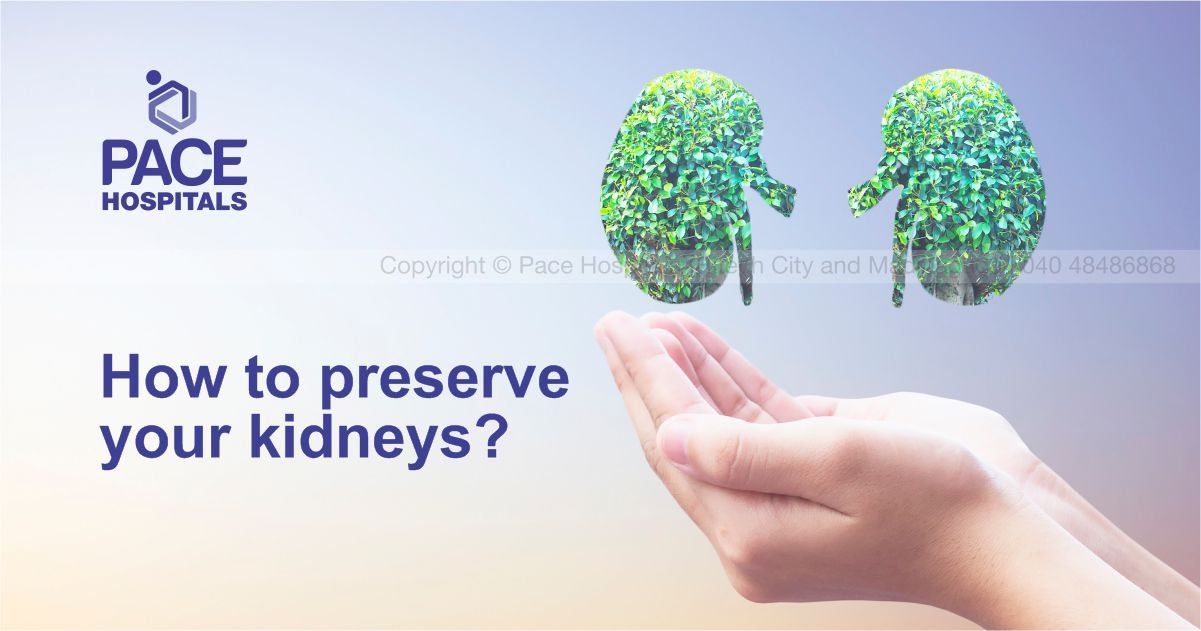How to preserve your kidneys? These 16 Tips every one should follow to have healthy kidneys.
PACE Hospitals
Kidneys do many important jobs essential for our body like removing waste products and extra water in the form of urine. They also help in controlling blood pressure, keeping bones healthy and making red blood cells. Kidney disease lasting for less than 3 months is called acute kidney injury or disease. Chronic kidney disease is which is present for more than 3 months. Even if kidneys fully recover in the case of acute kidney injury it can have long term consequences on health
Risk factors for kidney disease:
- Diabetes
- Hypertension (high blood pressure)
- Kidney stones
- Infections (urinary tract or systemic)
- Overweight and obesity
- Over the counter pain killer use
- Previous acute kidney injury
- Family history of kidney disease
- Very low birth weight
Tests to identify kidney disease:
- Complete urine examination: Urine will be checked for the presence of protein, blood or any abnormal elements. Normally urine has very small amount of protein. Any increase in protein in urine will suggest presence of kidney disease in the appropriate clinical context. Presence of red blood cells in urine also point towards the presence of kidney disease requiring further tests to confirm.
- Blood test: Blood will be checked for levels of urea and creatinine which are elevated in the presence of kidney disease. Creatinine values are used to calculate GFR in the clinic.
- Ultrasound: It will help us to identify the location, number, size and appearance of kidneys. Helps in examination of ureters, bladder and the presence of stones in urinary tract. Patients with chronic kidney disease may have small kidneys, abnormal kidneys or obstructed kidneys.
What are the complications of kidney disease?
Kidney disease can lead to high blood pressure (high blood pressure can cause CKD and CKD can also cause high blood pressure), low haemoglobin levels (anaemia), bone weakness, heart ailments, vitamin D deficiency, weight loss, abnormal calcium and phosphate levels, increased infection risk.
Tips for healthy kidneys:
- Be fit and active: Regular exercise maintains blood pressure and helps control blood sugar
- Stop smoking
- Avoid carbonated soft drinks
- Drink plenty of water
- Avoid over the counter pain killer intake: Regular use of nonsteroidal anti-inflammatory drugs (NSAIDs), such as ibuprofen and naproxen, can damage your kidneys
- Certain other medications, toxins, pesticides and illegal drugs (such as heroin and cocaine) can also cause kidney damage
- Take medications as directed
- Keep your blood pressure in the target range
- Stay in your target cholesterol range
- Eat foods lower in salt
- Eat more fruits and vegetables
- Keep your weight in target range
- Limit alcohol intake: Heavy alcohol consumption can raise blood pressure and add calories
- Get enough sleep
- Getting a check-up? Make sure to get your kidneys checked too with urine, blood and ultrasound tests
- Diabetic patients should keep their sugars in target range and get HbA1c levels checked regularly
Key questions to ask your doctor:
- What is my glomerular filtration rate (GFR)?
- What is my urine albumin result?
- What is my blood pressure?
- What is my blood glucose (for people with diabetes)?
Share on
Request an appointment
Fill in the appointment form or call us instantly to book a confirmed appointment with our super specialist at 04048486868
Appointment request - health articles
Recent Articles











